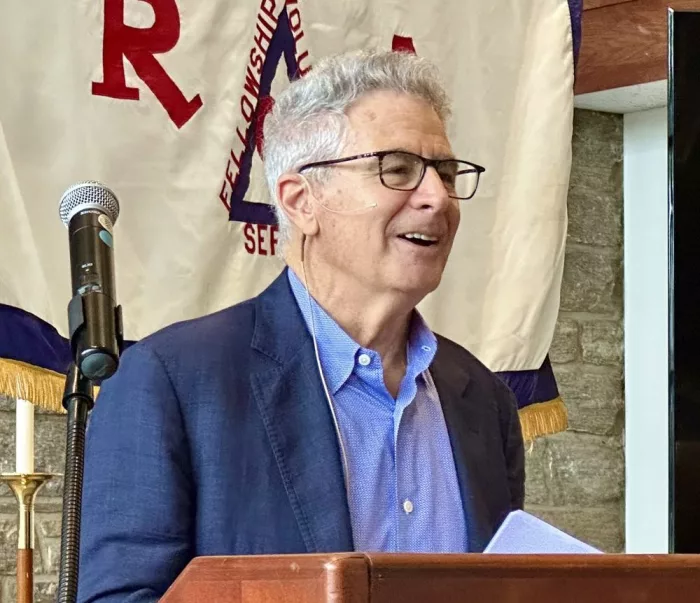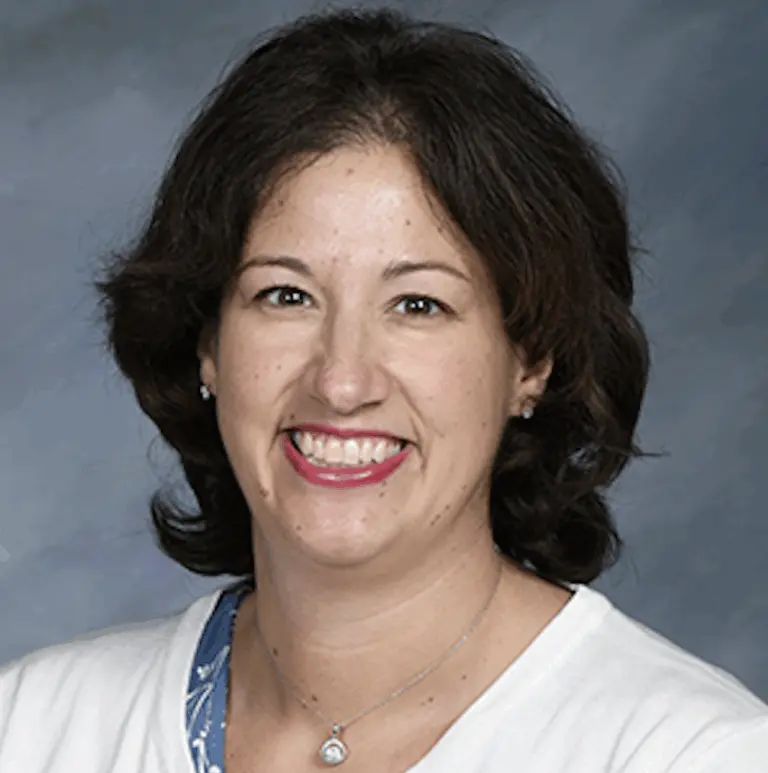
By Frank Scarpa
At the June 18th meeting of the Retired Men’s Association Bob Phillips introduced Larry Kantor, Ph.D (Ohio State U.), an economist from Atlas Merchant Capital. This was Dr. Kantor’s tenth appearance before the RMA. His topic: “Tariffs, Immigration, Taxes and Federal Spending: Implications for the Economy and Financial Markets.”
Dr. Kantor forewarned that his presentation would not be “political,” but the significant policy changes of the current administration are certain to have an effect on the economy, and discussion of these factors cannot be avoided. After all, tariffs and immigration restrictions both increase prices and reduce output. Forecasting in the midst of these changes is difficult, even for experts like Goldman Sachs and JP Morgan. The fact that war is brewing in the Middle East only complicates matters. However, Kantor concluded that the immediate effect on gasoline prices would be modest, despite Iran’s role as a major oil producer, pointing out that the U.S. is essentially energy-independent and is now a net exporter of oil and natural gas.
A central theme was tariffs, which Kantor clarified are absorbed by U.S. importers, not by foreign exporters, with costs largely passed on to consumers. He championed free trade’s historical benefits to the U.S.–lower inflation and boosted growth. While U.S. manufacturing faced costs from global competition, these are outweighed by broad gains for Americans enjoying cheaper goods and increased spending on services.
Kantor challenged negative perceptions of the U.S. trade deficit. He explained that dollars leaving the U.S. return as foreign capital, a unique advantage due to the U.S.’s unparalleled, liquid, and safe capital markets. This foreign investment, owning significant U.S. financial assets, helps keep interest rates low, supporting high investment despite a low domestic saving rate, thereby powering current and future GDP growth.
He warned that tariffs inevitably provoke retaliation. Prior Trump administration tariffs led to reciprocal duties that hurt U.S. agriculture and caused a decline in manufacturing employment preceding the COVID-19 pandemic. The average U.S. tariff rate surged to approximately 25% with China tariffs briefly hitting 145%, a “virtual embargo.” The “de minimus” exemptions on goods costing less than $800 were suspended on May 1. Market reaction was evident: a sharp rise in average tariff rates prompted Wall Street recession forecasts and capital flight. However, a subsequent 90-day tariff pause led to a market rebound, signaling the administration’s sensitivity to the “TACO trade” and accusations of market manipulation and insider trading. Kantor emphasized that tariff revenue would not significantly alleviate U.S. budget deficits or replace income taxes.
Shifting to immigration, Kantor predicted that reduced inflows would lower output and fuel inflation. Immigrants constitute a significant portion of our workforce and have accounted for most of its growth since 2004. Immigration is also vital for funding U.S. retirement benefits such as Social Security, which is facing depletion from an aging population. Solutions involve raising taxes, cutting benefits, or increasing immigration.
Addressing the U.S. budget, Kantor cited CBO projections of deficits that are around 7% of GDP. This would constitute the highest non-recession deficit since World War II. U.S. public debt has sextupled since 2007, with interest payments exceeding $1 trillion. Proposed budget changes, like extending tax cuts, would keep deficits elevated, offering only a modest economic stimulus.
For the Federal Reserve, these policies create a “supply shock” dilemma: tariffs raise prices and reduce output, while less immigration boosts wages and slows job growth. This bind means that the Fed will likely remain on hold.
Despite these complexities, Kantor concluded that the U.S, economy would “bend but not break” because it is resilient-thanks to solid job growth, low household and business debt and strong investment. He attributed the current lack of tariff-driven inflation to businesses “frontloading” imports. He forecast future inflation settling at 3-4%, higher than the pre-COVID era due to factors like supply chain diversification and increased trade barriers.
Interest rates are expected to remain elevated. While the stock market’s performance indicates optimism, Kantor regards current valuations as “expensive.”
In the brief Q and A session, the topic was China: Dr. Kantor pointed out that only 9% of Chinese exports go to the U.S. “They have all the cards,” despite suffering from a major “realestate bust” and excessive credit. But the Chinese can “handle weakness” better than the U.S.
The talk can be viewed by going to the RMA website at https://greenwichrma.org, and clicking on “Speakers.”
The RMA’s upcoming presentation, “Don’t Fall for It! Recognizing and Avoiding Scams” by Aaron Woodin, is scheduled for 11 AM on Wednesday, July 2, 2025. RMA presentations are held at Christ Church Greenwich, Parish Hall, 254 E. Putnam Avenue, Greenwich, CT 06830.
There are a variety of ways to get scammed, and the conduits are everyday, familiar objects which we all use – the computer, and the phone. In this informative presentation, which will reflect the latest trends, computer consultant Aaron Woodin will discuss some of the most common “con games” by which people are fleeced so they can be detected and avoided.
Born and educated in White Plains, Woodin studied journalism, but found computers far more interesting. He spent roughly seven years in corporate IT, before going fully on his own in the summer of 2002, founding his own consulting and computer repair company, PCVentures LLC, which is located in White Plains.
To stream the presentation by Aaron Woodin at 11 AM on Wednesday, July 2, click on https://bit.ly/30IBj21. This presentation will also be available on local public access TV channels, Verizon FIOS channel 24 and Optimum (Cablevision) channel 79.
Note: The views expressed in these presentations are those of the speakers. They are not intended to represent the views of the RMA or its members.
RMA speaker presentations are presented as a community service at no cost to in-person or Zoom attendees, regardless of gender. Any member of the public who would like to receive a weekly email announcement of future speakers should send a request to members@greenwichrma.org. The RMA urges all eligible individuals to consider becoming a member of our great organization, and thereby enjoy all the available fellowship, volunteer, and community service opportunities which the RMA offers to its members. For further information, go to https://greenwichrma.org/, or contact info@greenwichrma.org.




